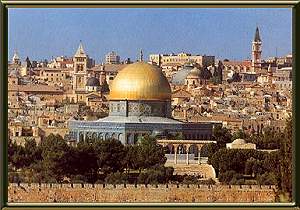Tuesday, December 26, 2006
fat planet on palestinian hip-hop
the great fat planet's post on Palestinian hip-hop, focusing on Ramallah Underground, with good mp3's to download.
Sunday, December 03, 2006
Fairuz in Beirut, 2

Another account of Fairouz's performance of Sah al-Nom in Beirut, by the inimitable Jim Quilty, writing in the Daily Star (Beirut).
Musical comedy, both timeless and timely
Fairouz returns to Beirut stage with a revival of the Rahbani brothers' 'Sah al-Nom'
By Jim Quilty
Daily Star staff
Monday, December 04, 2006
BEIRUT: "Sah al-Nom," a musical comedy starring Fairouz, directed by Ziad Rahbani and written by Assi and Mansour Rahbani, began a three-night run at the Beirut International Exhibition and Leisure Center (BIEL) on Friday night. It opened to somewhat less than a capacity crowd, a fact that says more about the prevailing political environment than the reputation and popularity of the artists involved.
Like so much of the Rahbani brothers' work, this play could be termed an allegorical fairytale. The writer-composers favored village idylls for their settings - places where folks burst into choral song at the drop of a hat and fall naturally into dabkeh-inflected dance.
"Sah al-Nom" is set in such a place. At center stage is a grand villa, in miniature, called the "Qasr al-Nom" (the Palace of Sleep) where the aging local wali (or lord) lives, apparently spending most of his time sleeping.
From time to time, though, he does rouse himself to actually rule. With great ceremony, he and his retainers assemble a court in the village square and hold a diwan where the villagers can approach him with their petitions.
The lord isn't exactly the model of enlightened governance. He listens to the villagers' petitions but seems as likely to relieve a petitioner of some possession he has taken a fancy to as to grant his wish. If it suits him, though, the lord grants the supplicant's wishes and stamps the document with his much-prized royal seal.
While most of the villagers seem content with their lot, one umbrella-toting village girl named Rumfoul (Fairouz) is a nagging inconvenience to the wali. Forever petitioning to have the roof of her house fixed, she carries the umbrella, she explains, to protect her from the elements.
Exhausted after listening to a few supplicants, the lord orders his retainers to leave him to sleep outside in his throne. Once he's asleep, Rumfoul swipes his royal seal and stamps the petitions of all the supplicants - all but one. Mischief done, she throws the seal down a well.
In Act II the wali wakes up from another long slumber and repeats the diwan ritual, only to realize his seal is missing. This causes all manner of grief and confusion, since without the seal he has no authority to rule.
One of the villagers - whose petition Rumfoul has torn up - suspects she has the seal and squeals on her. The lord confronts her and she admits to having thrown the seal down the well. With the help of the other villagers, then, she goes into the well to retrieve it.
The wali is so delighted to have regained his authority that, rather than having Rumfoul put in irons, he makes her the keeper of his seal when he's asleep. "When you were in the well," he says, "I wasn't thinking about the seal at all. I was worried about you."
There are any number of ways to approach "Sah al-Nom." It is, first of all, populist political satire - critical, then, but entertaining as well.
As a piece of restored popular theater, the revival's production values are about as sharp as you could hope for - particularly in the acoustic nightmare that is BIEL. The stage design of faux "mountain architecture" looks more genuine than some of the restored buildings in Solidere and the performance seems utterly true to the stage conventions of the 1960s and 70s.
Like the Rahbanis' music, the costuming is folksy and contemporary at once. The dancing (there's plenty of that) is crisp and tasteful, without the excesses of the more self-conscious neo-folk dance productions. The acting is both stylised and folksy and the spoken and sung text blends about as seamlessly as possible.
There were those in the audience who were of the opinion that the songs were performed in playback - "lip-synching" for those of the Milli Vanilli generation. These opinions couldn't be confirmed or denied when The Daily Star went to press.
If these songs were indeed taped in the studio before the show, though, the stage direction ensured that they were not obviously so. Nor is it difficult to discern why there would be pressure to pre-record - one informed estimate has it that Nouhad Haddad, the woman who became Fairouz, was born in 1935.
A lot has happened since this sweet little riff on Lebanon's neo-feudal political system was first staged 36 years ago.
On one hand Fairouz, the Rahbani brothers and Ziad Rahbani became cultural icons without peer in Lebanon. The distinction comes from the fact that, though their work has been politically engaged, they continued to be loved by Lebanese regardless of their sectarian, tribal or class association.
As such, their stature harkens back to a period when the things that divided Lebanese seemed less important than what unified them - whether to one another, the Palestinians or the wider Arab world.
"Sah al-Nom" - the plays of Assi and Mansour Rahbani generally, in fact - has thus accumulated layers of significance that make it a good deal thicker than it was when originally devised.
This musical's weight increases still more when you augment these combined layers of meaning with the piece's recent production history.
The Baalbek Festival announced that "Sah al-Nom" would open its 2006 season. When Baalbek fell victim to the July-August war with Israel, the metaphorical weight, especially for Lebanese of a certain generation, was much greater than you'd ascribe to a mere play.
Baalbek announced that it would stage the play in December - before anyone knew that the opening night would correspond with an open-ended opposition sit-in involving hundreds of thousands of Lebanese in Downtown Beirut.
By the time it opened on Friday evening, then, this work of childlike playfulness had become the artistic equivalent of a black hole - a play that absorbs any meaning you care to project onto it.
All the more reason, arguably, that the star's voice should sound as strong as possible.
It is highly informative of the Lebanese condition that (based on the number of times the audience burst into applause on Friday evening) "Sah al-Nom" still resonates with audiences in late 2006.
The orange tinge of Rumfoul's dress and umbrella, on the other hand, was surely no more than a trick of the stage lights.
Fayrouz performs in Beirut

New York Times, December 3, 2006
A Diva Brightens a Dark Time in Beirut
By KATHERINE ZOEPF
BEIRUT, Lebanon, Dec. 2 — As she stepped onto the stage, a tiny figure in apricot-colored silk, some in the audience broke into tears, while others clapped and cheered. As she lifted her lace parasol, turned her famous hooded eyes to the balcony, and her song began, ululations of joy erupted from several elderly Lebanese ladies in formal evening dress seated near the stage.
Fayrouz was performing in Beirut again at last, and her country, it seemed, had never needed her more.
In recent days, armored personnel carriers have moved into position along highway on-ramps, at major Beirut intersections and on a bridge overlooking the Hezbollah demonstrators at Martyrs’ Square, and fears and rumors that civil war might return have swirled. All the while, Beirutis of every sectarian stripe seemed to agree on this: Fayrouz must sing as planned.
In the Arab world, the emotional resonance this 70ish diva commands is difficult to overstate. Many of the great anthems of Palestinian and Lebanese nationalism — not factionalism — are her songs. Passengers on cheap overnight buses between Syrian cities know that morning has come and their destination lies near when the driver turns on Fayrouz.
From Damascus to Ramalla to Amman, Fayrouz’s unmistakable deep, quavering tones echo from radios and tape decks in cafes, shops and taxi cabs, reminding people of the long-lost rhythms of village life and the longer-lost, golden years of peace.
“Fayrouz is the music of our lives,” said a young Arab Israeli man in Haifa last week, who gave his name as Said. “She plays from dawn till midnight, every day, everywhere we go. She is the symbol of Lebanon and of Palestine. We all love her.”
Just how true that is in Lebanon seemed clear on Friday night, as she took the stage before tens of thousands of people at a convention center on the Beirut waterfront, to perform in “Sah el Nom,” a musical comedy. They had braved the demonstrations, blocked roads and multiple security checks to occupy white plastic chairs while scores of soldiers with AK-47s patrolled outside.
Some came from Beirut, some from Saida, a mainly Sunni town considered the gateway to southern Lebanon. Rosine Hajjar, 28, a psychotherapist from the Bekaa Valley, a predominantly Shiite region, said she had planned and saved for months for this night.
“Fayrouz is a dream for all Lebanese people,” Ms. Hajjar said. “She is majestic, she is mysterious, and it is very rare to see her. There were so many rumors this weekend of a coup d’état. But Fayrouz refused to cancel, and my sisters and I are so happy. Whether there is a new civil war or not, I feel sure that this will be the first and last time in my life that I will ever see her.”
Amal Hachem, 29, a lawyer from a Christian neighborhood in Beirut, said: “The fact that Fayrouz went ahead with this means a lot for Lebanese people. She is the symbol of Lebanon. Lebanon in war, Lebanon in peace, and Lebanon in revolution. She brings us together.”
“Sah el Nom” concerns a self-serving king who demands impossible favors when his people ask for help, but who comes to change his ways through the intervention of a good, brave village woman, played by Fayrouz.
But even symbolism and inspiration sometimes have to take a back seat to age and the sound requirements of a convention center. As the performance progressed, there were hisses and whispers — soon hushed by diehard admirers — as her lips occasionally moved out of time to the voice singing from the speakers, or as she focused on dancing, and the voice sang on.
Born more than 70 years ago — no one seems certain just how many — as Nouhad Haddad, she was dubbed Fayrouz, or Turquoise, by an early musical mentor. For more than 50 years, she and several family members — her husband, the composer Assi Rahbani, his brother Mansour, a lyricist, and a son, Ziad — have been the musical royal family of the Levant. The Rahbani brothers wrote most of the material that Fayrouz has regularly performed throughout her career, including “Sah el Nom.”
They are the rarest of public figures in Lebanon: artists whose standing is above politics. Throughout the 15 years of Lebanon’s civil war, they never took sides.
Fayrouz was to sing in “Sah el Nom” at the ancient Roman acropolis in Baalbeck, where an international music, theater and dance festival is held each summer. But the Israeli-Hezbollah war began that very evening, and the performance was canceled.
Throughout the 34-day war, Fayrouz’s patriotic songs, including “To Beirut” and “The True Lebanon Is Coming,” were everywhere. But she never appeared.
The festival’s organizers decided to move the program to Beirut. Fayrouz had not performed here since 1994, and ticket sales were frantic.
May Arida, the festival’s president, watched as the audience filed in on Friday night. “We knew there would be some fear,” she said. “We didn’t make the decision until yesterday, but we finally decided that the show must go on. In a difficult time, we need Fayrouz.”
Thursday, November 09, 2006
Sapho, French-Moroccan-Jewish singer, in Beirut

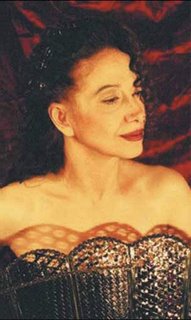
"French-Moroccan singer Sapho thrills audience with her modern rendition of timeless classics"
By Zeina Nasr
Special to The Daily Star
Thursday, November 02, 2006
Review
BEIRUT: Photographers hover around a slight woman, their cameras busily clicking and flashing. She wears a sleeveless black top and a long, sparkling silver skirt. A diaphanous white shawl is draped over her shoulders. Her thick curls surround a pale visage with dark eyes and fine features. Her lips are painted a deep red. She obliges the press with a sunny smile, playing the part of agreeable celebrity. Agreeable she is - sincere, warm and infectiously exuberant.
The French-Moroccan singer Sapho's two-night run at the French Cultural Center encapsulates Lebanon's recovery, marking one of the first international performances to be held in Beirut since the end of this summer's war. Prior to her first concert Tuesday night, she explained she had always wanted to perform in Lebanon but hesitated when people had told her the country hadn't become safe enough to receive her. Yet here she is, in the wake of Lebanon's least safe season in years.
Lebanon is "a country of conflict but also a country of encounters and of alterity," says Sapho, who harbors a lifelong attraction to cultures of clashing multiplicity. She says she came to Lebanon now both despite and because of the recent war. She wanted to make a statement of support and a gesture of understanding; she did not seek to simply distract a traumatized population with her music. After all, she is implicated by personal and artistic experience in the region's tumultuous history.
A Moroccan Jew born in Marrakesh, Sapho moved to France with her family when she was a teenager. After studying theater and music, busking on the cafe terraces of Saint-Germain-des-Pres and experimenting with numerous alter egos, she eventually adopted the stage name Sapho after the ancient Greek poetess. In the years that followed, she landed several record deals and performed in a dizzying variety of musical genres from American rock to flamenco and spoken word.
In 1992, she undertook Umm Kulthum's epic "Al-Atlal." Under the guidance of Lebanese orchestra conductor Elie Ashkar, Sapho managed to produce a critically acclaimed interpretation of the legendary song. "Al-Atlal" served as a defining moment, shifting Sapho's music toward an eclectic sound driven by Arabic and Andalusian influences. As she is fond of asserting, "I consider myself a citizen of the world and a singer of the world."
Sapho admits that despite an intellectual mastery of French, her singing voice moves more readily in Arabic - not classical Arabic but colloquial Moroccan, she explains, the language of her childhood and the language of the street, which melds her music into her political life. To sing in colloquial Arabic is to sing with the voice of the people.
Such a stance is not a matter of political ideology for Sapho but rather a means to convey honest and immediate experience. The political positions she takes, Sapho explains, embody her personal attempts to embrace her own culture: "We are, after all, simply subjects trapped in bodies, and our art is but a memoir of our experience."
In 1994, Sapho performed "Al-Atlal" to an audience of Israelis in Jerusalem. Four years later, she performed a seminal concert in Gaza. "Art is dangerous!" she exclaims, "whether one is politically engaged or not. To be an artist and a poet is to subvert language and to subvert meaning - to be subversive!"
Sapho's latest act of subversion involves setting Leo Ferre's classic songs to the flamenco guitar of Vicente Almaraz. First performed in the fall of 2005, the Ferre a la flamenco project continues to attract and charm audiences, having received abundant critical praise in France.
This is the repertoire Sapho brought to Beirut, aware that a Lebanese audience may feel the same formative love for Ferre as she does, having grown up with his erudite love songs, anti-war anthems and odes to anarchy.
"Ferre turned esoteric and inaccessible French poems into beautiful and popular music," she explains, and it is to this populist spirit of cultural engagement she pays homage.
The first of Sapho's two concerts opens with Almaraz's solo guitar. He has arranged the music in collaboration with Sapho, and it's clear from the inaugural melody that a distinctly Andalusian sound will characterize what follows.
Sapho appears on stage and slowly adjusts her shawl, leaning her torso forward to sing the opening lines of "Il N'Aurait Fallu" - a song set to a poem by Louis Aragon.
The words arise from her body like primal sounds that flirt with melody. She moves in and out of lyricism, lacing her notes with scratchy grit, bending her words to the stilted beats of speech. Her voice is at once grating and soothing, harshly guttural in its attacks and resonantly fluid in its releases. As the song unfolds, it is clear that she has succeeded in mastering Ferre's approach while preserving the recitative rhythms and poetic expression of Aragon's verse.
As she moves through a careful selection of Ferre's vast catalogue, singing favorites like "Est-Ce Ainsi Que les Hommes Vivent," "Monsieur William," "Avec le Temps" and "Comme a Ostende," Sapho proves herself as not only a singer with a striking voice, but also as a sensually theatrical and deftly charming stage presence.
"Isn't it strange," she quips, "that all these sad songs and depressed poets bring us nothing but happiness?"
As her final song comes to an end, the crowd asks for more, and Sapho impishly expresses her relief at being asked for an encore. The night's surprise guest, oud virtuoso Charbel Rouhana, waits in the wings. What comes next is the climax of the performance: a rendition of "Avec le Temps" sung in colloquial Moroccan followed by an excerpt from "Al-Atlal."
The crowd at the French Cultural Center is astounded. For those who know and love Umm Kulthum, Sapho's rendition is uncanny. For those who are not ardent fans of the original, Sapho's more accessibly modern approach is a revelation. The cante jondo ("deep song") of flamenco meets the soaring melisma of tarab and the results are nothing short of a fertile musical evolution.
Monday, October 09, 2006
More on Palestinian-Israeli Rap
From the Washington Post:
"Yo, Word Up, Arabz"
By Richard Morin
Thursday, April 20, 2006; A02
Think black rappers are angry? Well, check out this raging rhyme tossed down in Arabic by Arab Israeli rapper Tamer Nafar and his crew DAM:
You're a Democracy?
Actually it's more like the Nazis!
Your countless raping of the Arabs' soul
Finally impregnated it
Gave birth to your child
His name: Suicide Bomber
And then you call him the terrorist?
The song "Meen Erhabe" (or, "Who Is the Terrorist?"), released in 2001 over the Internet, became the first Arabic rap hit and spawned a new kind of rap that is spreading quickly throughout the Middle East, communications lecturer Usama Kahf of California State University at Long Beach says in an article under review by the Journal of Popular Music Studies.
A dozen rappers -- mostly Palestinians -- fill the Arab streets with rap and hip-hop beats, according to Kahf's review of the nascent genre. DAM is the best-known. The trio has toured throughout the Middle East and in Europe. Other acts have emerged in Algeria, Lebanon, Egypt and elsewhere. Several Web sites, notably ArabRap.net, serve as nerve centers for Arabic rap and help spread the music under the radar of government censors.
Still, many nonsecular Arabs view rap as another intrusion of Western culture and "an affront to [Arab] heritage or an imitation of the West," Kahf wrote.
Arabic rappers respond to the challenge by using traditional instruments behind familiar rap beats. They defend Arabic rap by contending in their rhymes that rap is the new universal musical language of marginalized people, Kahf said. And instead of rapping about Cristal and bling, they focus on social and political problems.
"Yo, Word Up, Arabz"
By Richard Morin
Thursday, April 20, 2006; A02
Think black rappers are angry? Well, check out this raging rhyme tossed down in Arabic by Arab Israeli rapper Tamer Nafar and his crew DAM:
You're a Democracy?
Actually it's more like the Nazis!
Your countless raping of the Arabs' soul
Finally impregnated it
Gave birth to your child
His name: Suicide Bomber
And then you call him the terrorist?
The song "Meen Erhabe" (or, "Who Is the Terrorist?"), released in 2001 over the Internet, became the first Arabic rap hit and spawned a new kind of rap that is spreading quickly throughout the Middle East, communications lecturer Usama Kahf of California State University at Long Beach says in an article under review by the Journal of Popular Music Studies.
A dozen rappers -- mostly Palestinians -- fill the Arab streets with rap and hip-hop beats, according to Kahf's review of the nascent genre. DAM is the best-known. The trio has toured throughout the Middle East and in Europe. Other acts have emerged in Algeria, Lebanon, Egypt and elsewhere. Several Web sites, notably ArabRap.net, serve as nerve centers for Arabic rap and help spread the music under the radar of government censors.
Still, many nonsecular Arabs view rap as another intrusion of Western culture and "an affront to [Arab] heritage or an imitation of the West," Kahf wrote.
Arabic rappers respond to the challenge by using traditional instruments behind familiar rap beats. They defend Arabic rap by contending in their rhymes that rap is the new universal musical language of marginalized people, Kahf said. And instead of rapping about Cristal and bling, they focus on social and political problems.
Sunday, August 20, 2006
More on Palestinian and Israeli and Palestinian-Israeli hip-hop

Article entitled "Levantine Hip-Hop 101: Who's who in the Middle East rap game," by Neal Ungerleider, appearing in Slate on Friday. The title of the article is misleading, for this is really about hip-hop in Israel and Palestine. Over the last year or so, a number of such articles have appeared in the US media. And like the others, on the Palestinian side, the article focuses on the Palestinian-Israeli group Dam. Ungerleider is incorrect about the Arabic translation for "Dam": it means "lasting" or "persisting," not "blood." (It's pronounced more or less like the English word "dam"; "blood" in Arabic is "damm," with a short "a" and a doubled "m.") Ungerleider offers more discussion of Israeli rappers than I've seen before. Like the previous articles, he discusses Israeli rapper Subliminal, who used to be close to Dam's leader Tamer Naffar but has since become right-wing. He also mentions Sagol 59 and Rebel Sun, who he says, are leftwing, unlike Subliminal.
But here's the most interesting piece of info: he announces an "Israeli and Palestinian Hip-Hop Showcase for Peace," to occur in New York City in September as part of the Jewish Music and Heritage Festival. The organizers call a "hip-hop sulha." A "sulha" is a traditional Palestinian mechanism that aims at peacemaking and reconciliation. The artists include (and I quote) "Top-selling Israeli hip-hop artist Shaanan Street of HaDag Nachash (whose last U.S. tour sold-out coast-to-coast); Palestinian rapper Saz (who has been the subject of two documentary films); Jewish American beatboxer Yuri Lane; the godfather of Jerusalem's underground hip-hop scene, Sagol 59; Orthodox Jewish rap sensation Y-Love; turntablist sensation DJ Spooky; DJ Handler; and the frontmen of two of the West Coast’s leading Palestinian hip-hop outfits, Ragtop of the Philistines and Omar of the N.O.M.A.D.S."
Tags: Palestine, Israel, hip-hop
Wednesday, August 16, 2006
Struggling artisans remember when Iraq was better known for lutes than looting
From Agence France Presse: "Baghdad used to be renowned for the quality of lutes turned out by its artisans. Iraqi lutes were so sought after that special government permission was needed for them to be exported."
Tag: Iraq
Tag: Iraq
Monday, August 07, 2006
Monday, July 31, 2006
Algerian Hip-Hop: MBS
From qantara.de, a piece by Arian Fariborz on Algerian rap group MBS (Le Micro Brise Le Silence). MBS dates the origins of rap in Algeria to the urban uprisings of 1988. I have a copy of the group's only CD released in the US, Le Micro Brise Le Silence, which is fabulous. I've not heard Rabah President, discussed here.
"In its country of origin, hip hop culture now seems to mean little more than hedonism, conspicuous consumption, and illusory ideas about violence and sex. In Algeria, the almost-forgotten potential of that culture is audible once again. Here, rap means speaking about reality, about an everyday life that is often frankly depressing, about political injustice, terror and war."
"In its country of origin, hip hop culture now seems to mean little more than hedonism, conspicuous consumption, and illusory ideas about violence and sex. In Algeria, the almost-forgotten potential of that culture is audible once again. Here, rap means speaking about reality, about an everyday life that is often frankly depressing, about political injustice, terror and war."
Monday, July 17, 2006
Article on Shaaban Abdel Rahim
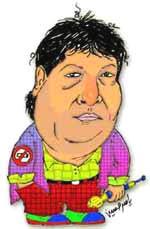
From Transnational Broadcasting Studies (TBS) 16, a very useful article: "The Fool Sings a Hero's Song: Shaaban Abdel Rahim, Egyptian Shaabi, and the Video Clip Phenomenon," by James R. Grippo, UCSB PhD candidate in ethnomusicology.
Here's the last paragraph:
Contributing to ‘Abd al-Rahim’s controversial success is his social positioning as the next superstar descending from a historic line of political sha‘bi singers in Egypt. Finally, ‘Abd al Rahim’s success must be understood in the context of the West’s loosely defined War on Terror. The perception of cultural and political attack from outside the Arab world has sparked the need for amplified voices speaking sympathetic truths to a self-consciously cornered Muslim population. ‘Abd al-Rahim’s uncanny sense of Arab anger and frustration has enabled this illiterate ironer from Mit Halfa to become one of the loudest of these voices.
Thursday, July 13, 2006
Lebanese vocalist Rima Khcheich: splicing the Eastern classical and jazz idioms

Jim Quilty, writing in the Daily Star, on a Lebanese female singer in the vein of Ziad Rahbani.
Meanwhile, Ziad's mother Fairuz had her Thursday concert at the Baalbek International Festival "delayed" due to what the US press insists on calling Israel's "crossing" into Lebanon.
Monday, July 03, 2006
Iranian rock and hip-hop
An interesting story on NPR, reviewing a documentary called "Sounds of Silence," by Amir Hamz and Mark Lazarz, on Iranian rock and rap. It includes samples from O-Hum, Barobax and Hich-Kas.
Go here to view a video by rap group Hich-Kas. Download songs by Hich-Kas here. Go to the Wikipedia article on Hich-Kas to find more zipped mp3s.
Go here to view a video by rap group Hich-Kas. Download songs by Hich-Kas here. Go to the Wikipedia article on Hich-Kas to find more zipped mp3s.
Thursday, April 27, 2006
Lyrics for "Biladi" (Motherland) and "Ana Samid" (I Remain Steadfast)

(from Palestine Lives! Songs from the struggle of the people of Palestine, Paredon Records, 1974.)
Biladi
Motherland, motherland
Fat'h is a revolution against the enemy
Palestine, the land of our forefathers
To you we will return
Fat'h is a revolution that shall win
Assifa is the hope of my motherland
Palestine, oh great love,
You are my goal and my destiny.
To you I walk, and my determination
Shall overcome oppression
Palestine, birthplace of Christ,
Destination of Muhammad's journey,
Liberate my wounded land,
Cleanse from it the usurpers.
Palestine, my only hope,
To you we shall restore
The dignity of our destitute people,
Under the banner of protracted struggle.
Palestine, your people shall not die
It shall defy silence, and Assifa
Shall keep the finger on the trigger.
Assifa walks there,
Planting the land with explosives
Loaded with destruction and doom
For every exploiter of the motherland
Samid (I Remain Steadfast)
I am steadfast, steadfast, I am steadfast
In my homeland, I am steadfast.
If they snatch away my bread, I am steadfast
If they murder my children, I am steadfast
If they blow up my house, O my house
In the shadow of your walls, I am steadfast
With pride, I am steadfast
With a stick, with a knife, I am steadfast
With the flag in my hand, I am steadfast
And if they cut off my hand and the flag
With the other hand, I am steadfast
With my field and my garden, I am steadfast
With determination in my beliefs, I am steadfast
With my nails and my teeth, I am steadfast
And if wounds in my body should multiply
With wounds and my blood, I am steadfast
Fayruz, "Sanarni'ju Yawman" (We Shall Return Someday)
Lyrics for Fayruz, "Zahrat al-Mada'in (The flower of cities)"

These are excerpts, from Joseph Massad's article, "Liberating Songs"
It is for you that I pray, O city of prayers
For you I pray, O Jerusalem
The gate of our city shall not be locked,
For I shall got to pray.
I shall knock at the gates,
And I shall open up the gates
O River Jordan, you shall wash
My face with your holy water
And you shall erase, O River Jordan
The remaining footprints of the barbarians.
For Jerusalem is ours, and the house is ours
With our own hands we shall restore the glory of Jerusalem
With our own hands, we shall bring peace to Jerusalem
Peace shall come to Jerusalem
Tuesday, April 25, 2006
Lyrics for DAM's "Who's A Terrorist?" (Min Irhabi?)
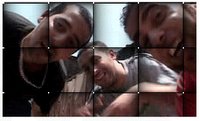
Who's a terrorist?
I'm a terrorist?!
How am I a terrorist when you've taken my land?
Who's a terrorist?
You're the terrorist!
You've taken everything I own while I'm living in my homeland
You're killing us like you've killed our ancestors
You want me to go to the law?
What for?
You're the Witness, the Lawyer, and the Judge!
If you are my Judge
I'll be sentenced to death
You want us to be the minority?
To end up the majority in the cemetery?
In your dreams!
You're a Democracy?
Actually it's more like the Nazis!
Your countless raping of the Arabs’ soul
Finally impregnated it
Gave birth to your child
His name: Suicide Bomber
And then you call him a terrorist?
You attack me and then you cry
And then you rush to complain about me [to the world]
When I remind you that you started the whole thing,
You jump to say
"You let small children throw stones!
Don’t they have parents to keep them at home?"
WHAT?!
You must have forgotten you buried our parents under the rubble of our homes
And now while my agony is so immense
You call me a terrorist?
Who's a terrorist?
I'm a terrorist?
How I am a terrorist
When you've taken my land?!
Who's a terrorist?
You're the terrorist!
You've taken everything I own
While I'm living in my homeland
Why terrorist?! Because my blood is not calm
It's boiling!
Because I hold my head for my homeland
You've killed my loved ones
Now I'm all alone
My parents driven out
But I will remain to shout out
I’m not against peace
Peace is against me
It’s going to destroy me
You don't listen to our voices
You silence us and degrade us
And who are you?!
And when did you became ruler?
Look how many you've killed
And how many orphans you've created
Our mothers are crying
Our fathers are in anguish
Our land is disappearing
And I'll tell you who you are!
You grew up spoiled
We grew up in poverty
Who grew up with freedom?
And who grew up in confinement
We fight for our freedom
But you've made that a crime
And you, the terrorist call me the terrorist!
Who's a terrorist?
I'm a terrorist?
How I am a terrorist
When you've taken my land?!
Who's a terrorist?
You're the terrorist!
You've taken everything I own
While I'm living in my homeland
So when will I stop being a terrorist?!
When you hit me and I turn the other check
How do you expect me to thank
The one who harmed me?!
I tell you what!
You tell me how you want me to be!
Down on my knees with my hands tied up
My eyes to the ground
Surrounding by bodies
Houses destroyed
Families driven out
Our children orphaned
Our freedom chained up
You oppress
You kill
We bury
We'll remain patient
We'll suppress our pain
Most importantly you feel secure
Just relax and leave us all the pain
You see our blood is like that of dogs
NOT EVEN
When dogs die they receive sympathy
So our blood is not as valuable as a dogs
No - My blood is valuable
And I will continue defending myself
Even if you call me a terrorist
Monday, April 24, 2006
Sabreen lyrics, "Here Come the Doves" (Hussein Barghouthi)

The Gypsy
I'm really a Gypsy
My job is to dance
To entertain whose who are sad
I tell fortunes for a penny-and-a-half
And I tell fortunes for the oppressed
Sitting around the hubbly-bubbly
Elbow-leaning by the fire
A boiling midnight fire
I eat only with the sweat of my brow
I'm no tyrant and no horse thief
My job is to dance
An off-beat dance
My beard is long and supports a family
And the prettiest girls are Gygpsies
I live on old things
Selling horses and antiue coins
Silver ankle-bracelets and tales
I've stood so often by prison gates
I danced and feared and said: it'll pass
I'm really a Gypsy
this is my fate
I read fortunes
In people's palms
Thirty Stars
Thirty stars twinkling over a cypress valley
Thirty stars twinkling
My heart is an open caern
If only the pretty one
Would understand
That the moon is wounded
But hope is power
Thirty stars falling over a cypress valley
Thirty stars falling
Half of a lifetime falling
And the days have changed
And dreams exchanged
And a cypress tree has broken
My heart is an open cavern
If only the pretty one
Would understand
That the moon is wounded
But hope is power
Ramallah 1989
Sometimes I walk alone
In the middle of the night
And the night is like a river
My hands in my pockets
I whistle, or smoke
In so much bitterness
The whole town is shuttered
No one around
But the void
And the army
And the wind playing
With the street lamps
Or in my hair
I stand by the fence
My chin in my hand
I stand and think, how?
All that's left of a lifetime
Is a month merely
Yet I walk, whistle or smoke
In so much bitterness
The Pirate
You are a rose
With a very thin waist
The world, rose, is made
Of strong and weak
And you are soft
Like chewing gum
And I'm an old Turkish pirate
I have a ship
Inside the harbor
The harbor is buying and selling and theft
The harbor is
Wheat and rice and water
And God has forgotten us
Inside the harbor
And I'm an old Turkish pirate
With a pipe in my hand
And a sheep-skin on my back
Carrying silver and coins
I have a ship, forgotten by God
And God has forgotten us
Inside the harbor
Come, rose, come with me
The sea is my father, keep company with me
For I'm just an old Turkish pirate
My intentions are good
And my heart is clean.
Sabreen lyrics
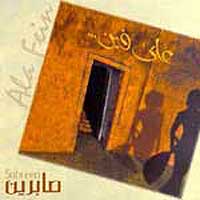
Kohl (Ala Fein, lyrics Talal Heidar)
This earth is swinging
Swaying this way and that
It's so very light
It can be carried by two. And tiny
doves can cross it
in two days
So I thought it yet to come...
She knocked on Time's door
to ask if two nights, long lost
Were his
He offered her two days
And told me not to say
That the nights are now kohl in the eyes
Mayyala (Ala Fein, lyrics Talal Heidar)
La, la, uncle Lala
There's a woman named Mayyala
Come from a distant village
Come to sing her mawwal
People saddened her so
To sit in her shadow she did go
I planted her, as a willow tree
And so embarrassed was she
On Man (Smoke of the Volcano, words Mahmoud Darwish)
They gagged his mouth,
Bound his hands to the rock of the dead
And said: Murderer!
They took his food, clothes and banners,
Cast him into the condemned cell
And said: Thief!
They drove him away from every port,
Took his young sweetheart,
Then said: Refugee!
O you with bloodshot eyes and bloody hands,
Night is short-lived,
The detention room lasts not for ever,
Nor yet the links of chains.
Nero died, Rome did not:
With her very eyes she fights.
And seeds from a withered ear
With wheat shall fill the valley.
Lyrics for "Nafad Al-Ahwal 2"
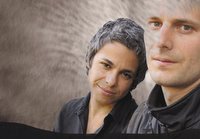
(from Wameedd, Kamilya Jubran & Werner Hasler. Lyrics by Paul Sha'ul)
Nafad Al-Ahwal
I stood in the middle of the room searching for my cases.
I inspected the lamp, the ashtray, loss and gain, the door and the statues. I got belittled in my own eyes so I stood in front of the mirror for long to see my face. I scrutinized the air full of smoke and coughs. I almost erased and forgot it.
I got belittled and belittled until I stood for long in front of the door to enter, then to exit, and then without a sound I stretched on the armless, open and mute bed. There I remembered what happened.
I remembered the day I was killed, raped, cut to pieces lemon by lemon, cigarette by cigarette, was ripped and for the first time I cried for my death and for nature.
Palestinian music websites

Sabreen (pictured)
Kamilya Jubran (former Sabreen lead singer)
Ramallah Underground: download samples of Palestinian hip-hop and electronica from Ramallah. Check the links for more music!
Dam (Tamer Nafar).
Monday, April 10, 2006
CD of Arab Jewish musicians

I will pass this CD out on April 11:
1. "Hineh Ma Tov," David and The High Spirit, The Jewish Sampler Vol. III
--This is an example of Shirei Eretz Yisrael (Songs of the Land of Israel): the hegemonic Ashkenazi popular music of Israel til at least the '70s
2. "Shir Shabbat," Nati Levi, 16 Oriental Israeli Soul Songs (vol. 3)
--An example of "Greek" sounding Mediterranean Israeli music
3. "Tipat Mazal (A Bit Of Luck)," Zehava Ben, Best Of Zehava Ben
--Zehava Ben's first big hit, "Turkish" style
4. "Hubi Ei," Zehava Ben, Best Of Zehava Ben
--Egyptian pop style
5. "Ma Yafou Dadaich - Mawal," Emil Zrihan, Ashkelon-Morroccan Mawal
6. "Ma Yafou Dadaich," Emil Zrihan, Ashkelon-Morroccan Mawal
--Zrihan is the cantor of the Ashkelon synagogue in Israel. This song is sung in Hebrew but the style is Moroccan Andalusian. The "mawal" is the vocal introduction, improvised; the instruments join in for the second part of the song. The melody is a popular song in the Andalusian repertoire, "Koum Tara." (Enrico Macias and Cheb Mami recorded it as a duet.)
7. "Ram Lechasdakh," Syrian Jews of Brooklyn, Let Jasmine Rain Down
--An example of the piyyutim, or religious poems, put to contemporary melodies.
8. "Yachid Ram," Syrian Jews of Brooklyn, Let Jasmine Rain Down
--Another example of piyyutim, this time performed in maqam bayati.
9. "Dana International (Airport Version)," Dana International, Danna International
10. "Samar Mar," Dana International, Danna International
--A version of a song originally recorded by Egyptian pop star Hasa al-Asmar
11. "Arusa," Dana International, Danna International
12. "Saida Sultana," Dana International, Danna International
--Whitney Houston ("My Name Is Not Susan") goes to Saudi Arabia
13. "Maganona," Dana International, Maganona
--Crazy!
14. "Paid in Full (Seven Minutes of Madness - The Coldcut Re-mix)," Eric B & Rakim, Colors (Soundtrack)
--This song, which samples Ofra Haza's "Im Nin'alu," made Ofra famous
15. "Im Nin'alu," Ofra Haza, Fifty Gates of Wisdom: Yemenite Songs
16. "Salma Ya Salama - Arabic Version," Alabina, The Album Vol II
--Eti Zach (pictured) & Los Niños de Sara. This song was a big hit for French star Dalida, who was born and raised in Egypt. The Dalida version was played when Egyptian President Anwar Sadat arrived at Ben Gurion Airport in Israel on his famous 1977 "peace" visit.
17. "Lolole (Don't Let Me Be Misunderstood)," Alabina, The Album Vol II
--"Don't Let Me Be Misunderstood" was a 1965 hit for The Animals (#3 in England, #15 in the US). Alabina sing it in Arabic and Spanish.
18. "Inqlâb Zidane 1," Enrico Macias, Hommage À Cheikh Raymond - Volume Un
--malouf from Constantine, Algeria
Friday, April 07, 2006
Guidelines for project 2
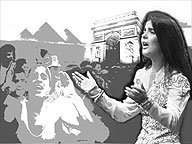
Choose between the following 3 options:
1. Questions for the readings for weeks 9-11 (Arab Jewish music): Amy Horowitz, in “Dueling Nativities,” argues that the kinds of musical practices exemplified by Zehava Ben are potentially disruptive of fixed identities and polarized claims to ownership of territory. Instead, such practices and borrowings create a sense of flexible rather than rigid identities, and as such, might contribute to the cessation, or at least the destabilization, of war.
Discuss Horowitz’s arguments, drawing on examples from at least FOUR of the articles assigned for weeks 9-11. (Only ONE of those articles should be by Horowitz.) You may also employ additional material (in addition to the 4 articles you’ve chosen), including the film, Zehava Ben: A Solitary Star, materials found on the blog for this class (mepop.blogstpot.com), and others.
Feel free to use the materials to argue against Horowitz’s claims, if you like. There is no “right” answer, what I am looking for are informed and well-argued answers. In order to make your arguments, you need to be very familiar with Horowitz’s “Dueling Nativities.”
2. Jonathan Shannon, in “Sultans of Spin,” explores how musical performance practices that are represented as “authentic” local spiritual traditions obtain their “authenticity” and “locality” through their enactment and staging in global performance contexts. One might add that they can also obtain “authenticity” and “locality” through global or Western practices of publicity and recording (and the publicity associated with the recordings: liner notes and the like).
Discuss Shannon’s arguments, drawing your examples from at least FOUR of the readings assigned for weeks 5-8. In order to do this question, you need to be quite familiar with the arguments Shannon makes. You may also draw on any additional material that you can locate.
3. If you prefer, you may choose a topic of your own (one that deals with the materials from weeks 5-11), but you MUST have it approved by me IN ADVANCE.
Papers are due, ideally, on April 13 (Thursday). If this is too early for you, please contact me. If any question is not clear, please contact me as well.
Thursday, March 16, 2006
More on Israeli Mediterranean Music
Edwin Seroussi, "'Mediterraneanism, in Israeli music: an idea and its permutations." Great article, with sound samples.
Monday, March 13, 2006
Listen to Bustan Abraham
Sunday, March 12, 2006
Pop Inshad

Here are a blog posting and an article from the Washington Post about "Pop Inshad," which has become massively popular in the Gulf and the Middle East. The most popular of these singers appears to be Sami Yusuf, a British citizen whose parents are Azerbaijani, and who has pop star looks. His videos are quite popular in Egypt, and Patricia Kubala explains why in a recent article in Transnational Broadcasting Studies (13). And Walter Armbrust provides an excellent analysis of Yusuf's video clip "Al Mu'allim" in the same issue of TBS.
Selim Nassib's novel about Umm Kalthoum

Today's New York Times Book Review contains a review of Selim Nassib's novel I Loved You For Your Voice, a fictionalized account of poet and lyricist Ahmed Rami for the great Egyptian diva, Umm Kalthoum. Here's what's interesting about the review is that it recommends the following: "Readers interested in the powerful story of Kalthoum's life would do better to read [Virginia] Danielson's intelligent and moving biography, 'The Voice of Egypt.'"
Bravo for Ginny!
(But does her book contain details such as these, which reviewer Lorraine Adams apparently derives from Nassib's text: As Om's popularity grows, rumors about her personal life dog her. Why is she celibate? Is she a lesbian?")
Saturday, March 11, 2006
Islamic/Sufi Music CD Tracklist

Here's the tracklist to the CD I passed out on Thursday:
1. "Taa Deem (Remix)," Asian Dub Foundation, Star Rise: Remixes (Remixes of Nusrat Fateh Ali Khan & Michael Brook)
2. "Sweet Pain (Remix)," Joi, Star Rise: Remixes (Remixes of Nusrat Fateh Ali Khan & Michael Brook)
3. "Samai Shadd-Araban," Al Kindi Ensemble, Arab Classical Music
4. "Concerning the seeking of salvation, Khalid Belrhouzi featuring Yusuf Islam, An Introduction to the Burdah by Sharaf al-Din Abi Abdullah al-Busiri
5. "Qur'an Recitation And Azan," Unidentified, Egypt - Echoes Of The Nile
Tuesday, March 07, 2006
Jonathan Shannon & the Fes World Sacred Music Festival of 2004

Read what Shannon says about the Fes Sacred Music Festival of '04 (scroll down a ways), and compare it to what he says about the '02 festival ("Sultans of Spin," p. 270. (He's pictured here with his wife, Deborah Kapchan; check out her remarks on the Gnawa.)
Sunday, March 05, 2006
Najat Aatabou website with downloads
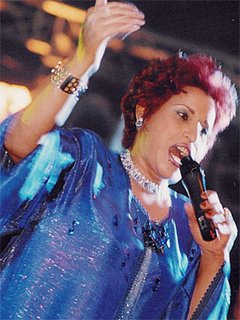
Najat Aatabou is one of Morocco's foremost female singers. Two fine CD's that give a fine sampling of Najat's large corpus of songs have been released in the West, Country Girls & City Women and Voice of the Atlas. The Chemical Brothers sample her on their 2005 hit, "Calvanize." Check out Najat's website and the free mp3's.
Tuesday, February 21, 2006
Jajouka: tracklist

The CD I'm passing out today:
1. "Gabahay," The Master Musicians Of Jajouka Feat. Bachir Attar, Apocalypse Across the Sky
2. "A Habibi Ouajee T'allel Allaiya," The Master Musicians Of Jajouka Feat. Bachir Attar, Apocalypse Across the Sky
3. "Bujloudia 'Bujloud Dancing with Aisha Qandisha,'” The Master Musicians Of Jajouka Feat. Bachir Attar, Apocalypse Across the Sky
4. "The Middle of the Night," The Master Musicians Of Jajouka Feat. Bachir Attar, Apocalypse Across the Sky
5. "55 (Hamsa oua Hamsine)," Brian Jones presents The Master Musicians Of Jajouka, Brian Jones presents The Pipes of Pan at Jajouka
6. "War Song/Standing + One Half (Kaim Oua Nos)," Brian Jones presents The Master Musicians Of Jajouka, Brian Jones presents The Pipes of Pan at Jajouka
7. "Your Eyes Are Like A Cup Of Tea - Beedie Mix," Master Musicians Of Joujouka, Brian Jones Presents The Master Musicians Of Joujouka -Remixes
8. "Under The Shadow Of Liberty," Bachir Attar, The Next Dream
9. "Track 7," Jajouka Musicians, One Night @ the 1001 vol. 1 (recorded by Brion Gysin)
10. "Up To The Sky, Down To The Earth," The Master Musicians Of Jajouka Feat. Bachir Attar, Master Musicians Of Jajouka (produced by Talvin Singh)
11. "You Can Find The Feeling," The Master Musicians Of Jajouka Feat. Bachir Attar, Master Musicians Of Jajouka (produced by Talvin Singh)
Thursday, February 16, 2006
Excellent annotated bibliography on Moroccan music
Here is a very useful annotated bibliography and discography dealint with the theme of "Moroccan Music: The 'Foreign' and the 'Familiar.'" Written by Karla Sabin as a term paper for a course offered at Oxford in Spring 2000 called Popular Culture in the Middle East (Sociology 470).
Greatest Gnawa

Here's the track listing of the CD I'm passing out in class today. Note that the focus is on gnawa "fusion" rather than straight-up gnawa.
1. "Baba El Gnawi," Gnawa Diffusion, Algeria
2. "Lahilla Express," Gnawa Impulse, Living Remixes
3. "Baba L'Rouami," Gnawa Night Spirit Masters (Mustapha Baqbou), Night Spirit Masters
4. "Merhba," Saha Koyo, Hamid El Gnawi
5. "Jinger Mama," Hasna El Becharia, Djazair Johara
6. "Marahaba," Hassan Hakmoun and Adam Rudolph, Gift of the Gnawa
7. "Soudan Minitara," Hassan Hakmoun and Zahar, Trance
8. "Moussa Berkiyo / Koubaliy Beriah La' Foh," Maleem Mahmoud Ghania w/ Pharoah Sanders, The Trance Of Seven Colors
9. "Rojo Changó," Omar Sosa, Sentir
10. "Mimouna," Orchestre National De Barbès, O.N.B. en concert
11. "Allal," Ray Lema & Tyour Gnaoua, Safi
12. "Marhaba Moulay Koummy," M'aalim Sam, Gnawa Leila: Vol. 4-Red & Green Suites
Monday, February 13, 2006
Electro-Gnawa
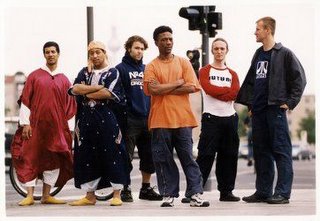
Here's a link to an article on a collaboration between Gnaouis and turntablists in Marrakesh, Morocco. The first couple paragraphs to the article are translated, and a link is provided to the original, which appeared in the Moroccan magazine Tel Quel.
The most interesting example of electro-Gnawa fusion I've heard is from Gnawa Impulse (pictured above), on their release, Living Remixes (GIP Music, 2002). It's a collaboration between a group of three Marrakesh Gnawa musicians who've recorded together as Gnawa Halwa, led by Abdenbi Binizi on lead vocals, and three German musicians active in the club scene.
Wednesday, February 08, 2006
"Aicha": Outlandish, Gellieman

Yesterday in class I showed the music video of Khaled's "Aicha," on a DVD which comes with the import version of Khaled's latest release, Ya-Rayi. (The DVD also includes the clips for "Didi" and "Abdel Kader," as well as a great documentary about Khaled's career and the making of Ya-Rayi.)
Some of my students said they knew the song Aicha courtesy of an underground video that swept the internet a couple years ago. The video they had seen features a Belgian teenager named "Gellieman," lipsynching to a recording of Aicha put out by the Danish R&B group, Outlandish (pictured above). Outlandish's members are: Isam Bachiri (of Moroccan origin), Waqas Ali Qadri (Pakistani origin), and Lenny Martinez (Honduran origin). (I don't know how these guys are faring in the wake of the Danish cartoon uproar.)
You can view the Gellieman video here. Outlandish's "Aicha" video can be seen at the band's website. Go to "Media" and then to "Videos."
Tuesday, February 07, 2006
Khaled's "Didi" lyrics
Here's a link to the lyrics of "Didi"--in Arabic, transliterated, and translated into English.
This link has now gone dead, it seems, so here's an alternative, from Leo's Lyrics Database:
ena bhar aaliya ou entia la
(I'm burning in the fire of love but you're not)
ma ndeerik ba'eeda ma nebki aalik
(I will not make you away from me so I don't cry later i.e. he wants to be always close from her)
la zhar la memoon la aargoob zine
(but I just have a bad luck and destiny)
CHORUS:
didi, didi, didi, didi, zin di wah
(take take, take take, take take, take take the beautiful girl away)
didi wah, didi, didi di hazzine daaayyeeeah
(take take, take take, take take take this beautiful girl away)
ma ndeerik ba'eeda ma nebki aalik
(I will not make you away from me so I don't cry later)
ma ndeerik ba'eeda ma nsaksi aalik
(I will not make you away from me so I don't ask about you later i.e. because she'll always be close from him he'll know everything about her and won't need to ask people about her)
la zhar la memoon la aargoob zine
(but I just have bad luck and destiny)
[CHORUS]
la baadouk aali l'jbal l'ghamqa
(even if they take you to the top of the highest mountain...)
derna l'melqa fil'jbal l'ghamqa
(I will still come to see you)
hzamt l'meryoula aala men darga?
(This literally means "who doesn't know her belt?". It's a metaphor that means "everybody knows her" or possibly means that she's known well by other men because she always hangs in bars, or maybe he's just saying "just like a woman that hangs in bars is known very well to other men, it's also very clear how I feel towards you (e.g. I love you)". This last one makes more sense to me and it's probably what Khaled is trying to say)
[CHORUS]
la zhar la memoon la aargoob zain
(I have a bad luck and destiny)
la zhar la memoon la qassam zain
(I have a bad luck and destiny)
qees el-shebka fil'bhar ou ebki aal'zhar
(drop the fishing net in the sea and cry on the bad luck -- this is another metaphor, he's describing his bad luck just like a fisherman who drops his fishing net in the sea and gets no fish)
[CHORUS]
hzamt l'meryoula aala men darga?
(who doesn't knokw her belt? (explained above)
rofd ahta ya moul el-taxi
(he's talking to the taxi driver but I'm not sure what he means by "rofd ahta")
hzamt l'meryoula khait spylo
(her belt is made of "spylo")
[CHORUS]
la zhar la memoon la aargoob zain
(I have a bad luck and destiny)
la zhar la memoon la qassam zine
(I have a bad luck and destiny)
qees el-shebka fil'bhar ou ebki aal'zhar
(drop the fishing net in the sea and cry on the bad luck)
[CHORUS]
aynik ki ayni aynik naymeen
(your eyes are sleepy -- he's describing her eyes, he says that they're not wide open, they're opened a little bit only. This is a sign of beauty (for him at least)
aynik ki ayni aynik mbalgeen
(your eyes are nice)
aynik ki ayni aynik shabbeen
(your eyes are beautiful)
[CHORUS]
derna el-melqa fil'jbal l'ghamqa
(I'll come to see even if you're on the top of the highest mountain)
derna el-melqa aand el-soosi jarha
(or I'll come to see you in the neighborhood (i.e. wherever she is, he'll do anything to see her)
rofd ahta aa moul el-taxi
(he's talking to the taxi driver, but again, I don't know what he means by "rofd ahta")
This link has now gone dead, it seems, so here's an alternative, from Leo's Lyrics Database:
ena bhar aaliya ou entia la
(I'm burning in the fire of love but you're not)
ma ndeerik ba'eeda ma nebki aalik
(I will not make you away from me so I don't cry later i.e. he wants to be always close from her)
la zhar la memoon la aargoob zine
(but I just have a bad luck and destiny)
CHORUS:
didi, didi, didi, didi, zin di wah
(take take, take take, take take, take take the beautiful girl away)
didi wah, didi, didi di hazzine daaayyeeeah
(take take, take take, take take take this beautiful girl away)
ma ndeerik ba'eeda ma nebki aalik
(I will not make you away from me so I don't cry later)
ma ndeerik ba'eeda ma nsaksi aalik
(I will not make you away from me so I don't ask about you later i.e. because she'll always be close from him he'll know everything about her and won't need to ask people about her)
la zhar la memoon la aargoob zine
(but I just have bad luck and destiny)
[CHORUS]
la baadouk aali l'jbal l'ghamqa
(even if they take you to the top of the highest mountain...)
derna l'melqa fil'jbal l'ghamqa
(I will still come to see you)
hzamt l'meryoula aala men darga?
(This literally means "who doesn't know her belt?". It's a metaphor that means "everybody knows her" or possibly means that she's known well by other men because she always hangs in bars, or maybe he's just saying "just like a woman that hangs in bars is known very well to other men, it's also very clear how I feel towards you (e.g. I love you)". This last one makes more sense to me and it's probably what Khaled is trying to say)
[CHORUS]
la zhar la memoon la aargoob zain
(I have a bad luck and destiny)
la zhar la memoon la qassam zain
(I have a bad luck and destiny)
qees el-shebka fil'bhar ou ebki aal'zhar
(drop the fishing net in the sea and cry on the bad luck -- this is another metaphor, he's describing his bad luck just like a fisherman who drops his fishing net in the sea and gets no fish)
[CHORUS]
hzamt l'meryoula aala men darga?
(who doesn't knokw her belt? (explained above)
rofd ahta ya moul el-taxi
(he's talking to the taxi driver but I'm not sure what he means by "rofd ahta")
hzamt l'meryoula khait spylo
(her belt is made of "spylo")
[CHORUS]
la zhar la memoon la aargoob zain
(I have a bad luck and destiny)
la zhar la memoon la qassam zine
(I have a bad luck and destiny)
qees el-shebka fil'bhar ou ebki aal'zhar
(drop the fishing net in the sea and cry on the bad luck)
[CHORUS]
aynik ki ayni aynik naymeen
(your eyes are sleepy -- he's describing her eyes, he says that they're not wide open, they're opened a little bit only. This is a sign of beauty (for him at least)
aynik ki ayni aynik mbalgeen
(your eyes are nice)
aynik ki ayni aynik shabbeen
(your eyes are beautiful)
[CHORUS]
derna el-melqa fil'jbal l'ghamqa
(I'll come to see even if you're on the top of the highest mountain)
derna el-melqa aand el-soosi jarha
(or I'll come to see you in the neighborhood (i.e. wherever she is, he'll do anything to see her)
rofd ahta aa moul el-taxi
(he's talking to the taxi driver, but again, I don't know what he means by "rofd ahta")
Lyrics of Khaled's "Aicha"
Comme si je n'existais pas
Elle est passée a coté de moi,
Sans un regard, reine de Saba
J'ai dit: Aicha, prends tout est pour toi
Voici, les perles, les bijoux
Aussi l'or autour de ton cou
Les fruits bien murs au goût de miel
Ma vie, Aicha, si tu m'aimes
J'irai ou ton souffle nous mene,
dans les pays d'ivoire et d'ebene
J'effacerai tes larmes, tes peines,
rien n'est trop beau pour une si belle
Aicha, aicha, écoute moi
Aicha, aicha, t'en vas pas
Aicha, aicha, regarde moi
Aicha, aicha, reponds moi
Je dirai les mots, les poèmes
je jouerai les musiques du ciel
Je prendrai les rayons du soleil
pour eclairer tes yeux de rêve
Aicha, aicha, écoute moi
Aicha, aicha, t'en vas pas
Elle a dit garde tous tes tresors
Moi, je vaus mieux que tout ça
Des barreaux sont des barreaux mêmes en or,
Je veux les mêmes droits que toi
Du respect pour chaque jour
Moi, je ne veux que de l'amour
Comme si je n'existais pas
Elle est passee a cote de moi,
Sans un regard, reine de Saba
J'ai dit: Aicha, prends tout est pour toi
Aicha, aicha, écoute moi
Aicha, aicha, écoute moi
Aicha, aicha, t'en vas pas
Aicha, aicha, regarde moi
Aicha, aicha, reponds moi
Elle est passée a coté de moi,
Sans un regard, reine de Saba
J'ai dit: Aicha, prends tout est pour toi
Voici, les perles, les bijoux
Aussi l'or autour de ton cou
Les fruits bien murs au goût de miel
Ma vie, Aicha, si tu m'aimes
J'irai ou ton souffle nous mene,
dans les pays d'ivoire et d'ebene
J'effacerai tes larmes, tes peines,
rien n'est trop beau pour une si belle
Aicha, aicha, écoute moi
Aicha, aicha, t'en vas pas
Aicha, aicha, regarde moi
Aicha, aicha, reponds moi
Je dirai les mots, les poèmes
je jouerai les musiques du ciel
Je prendrai les rayons du soleil
pour eclairer tes yeux de rêve
Aicha, aicha, écoute moi
Aicha, aicha, t'en vas pas
Elle a dit garde tous tes tresors
Moi, je vaus mieux que tout ça
Des barreaux sont des barreaux mêmes en or,
Je veux les mêmes droits que toi
Du respect pour chaque jour
Moi, je ne veux que de l'amour
Comme si je n'existais pas
Elle est passee a cote de moi,
Sans un regard, reine de Saba
J'ai dit: Aicha, prends tout est pour toi
Aicha, aicha, écoute moi
Aicha, aicha, écoute moi
Aicha, aicha, t'en vas pas
Aicha, aicha, regarde moi
Aicha, aicha, reponds moi
Monday, January 23, 2006
Preliminary Book List
A preliminary list of titles for students who want to write book reports (assignment #3)
V. Danielson, “The Voice of Egypt”: Umm Kulthum, Arabic Song, and Egyptian Society in the Twentieth Century
J. Goodman, Berber Culture On The World Stage: From Village To Video
A.J. Racy, Making Music in the Arab World: The Culture and Artistry of Tarab
M. Regev, E. Seroussi, Popular Music and National Culture in Israel
K. Shelemay, Let the Jasmine Rain Down: Song and Remembrance Among Syrian Jews
M. Stokes, The Arabesque Debate: Music And Musicians In Modern Turkey
S. Zuhur, Asmahan’s Secrets: Woman, War, and Song
V. Danielson, “The Voice of Egypt”: Umm Kulthum, Arabic Song, and Egyptian Society in the Twentieth Century
J. Goodman, Berber Culture On The World Stage: From Village To Video
A.J. Racy, Making Music in the Arab World: The Culture and Artistry of Tarab
M. Regev, E. Seroussi, Popular Music and National Culture in Israel
K. Shelemay, Let the Jasmine Rain Down: Song and Remembrance Among Syrian Jews
M. Stokes, The Arabesque Debate: Music And Musicians In Modern Turkey
S. Zuhur, Asmahan’s Secrets: Woman, War, and Song
Saturday, January 21, 2006
Schedule of Readings

ANTH 3903/3923H Middle Eastern Popular Music
WEEK 1 January 17-19 Introductions: the dominant
S. Blum, “Hearing the Music of the Middle East,” V. Danielson et al, eds., The Garland Encyclopedia of World Music: The Middle East
V. Danielson, “Snapshot: Opening Night for a Star Performer—Umm Kulthum and Inta ‘Umri,” in Danielson et al
V. Danielson, “The Arab Middle East” in P. Manuel, ed., Popular Musics of the Non-Western World
“The Umm Kulthum Nobody Knows,” in E. Fernea & B. Bezirgan, Middle Eastern Muslim Women Speak
WEEK 2 January 24-26 Rai
L.J. Jones, “North Africa: Overview,” in Danielson et al
Start Marc Schade-Poulsen, Men and Popular Music in Algeria
WEEK 3 January 31-February 2 Rai
Finish Schade-Poulsen
WEEK 4 February 7-9 Rai & World Music
B. Mazouzi, “Rai,” in Danielson et al
J. Gross et al, “Rai, Rap and Ramadan Nights,” in S. Lavie & T. Swedenburg, Displacement, Diaspora and the Geographies of Identity
L. Werner, “Arab Pop on the World Stage”
P. Bohlman, World Music: A Very Short Introduction (excerpts)
A. Morgan, “Rai: Music Under Fire,” in The Rough Guide to World Music, vol. 1
WEEK 5 February 14-16 Gnawa
P. Schuyler, "Review of Gnawa Leila"
P. Schuyler, “Music and Meaning among the Gnawa Religious Brotherhood of Morocco,” The World of Music 23.1, 1981
D. Kapchan, “Music in Performance: Following the Entranced Ones,” in Danielson et al
D. Kapchan, “Possessing Gnawa Culture”
T. Fuson, “Gimme the One Who’s Going: Trance, Groove and Interaction on the Gnawa Ritual Floor”
D. Kapchan, "Moroccan Gnawa and Transglobal Trance," Expedition 46.1, 2004
WEEK 6 February 21-23 Jajouka
P. Schuyler, “Joujouka/Jajouka/Zahjoukah: Moroccan Music and Euro-American Imagination”
W.S. Burroughs, Liner notes to Apocalypse Across the Sky
R. Palmer, “Into the Mystic: Secluded in the Mountains of Morocco, the Master Musicians of Joujouka Have Been Casting Musical Spells for Centuries”
T. Fuson, “Renewed Pandemonium: The Continuing Legend of the Master Musicians of Jajouka”
WEEK 7 February 28-March 2 Sufi
M. Frishkopf, liner notes to Music of the Sufi Inshad: Shaykh Yasin al-Tuhami
M. Frishkopf, “Snapshot: Shaykh Yasin al-Tuhami,” in Danielson et al
M. Frishkopf, “Tarab (‘Enchantment’) in the Mystic Sufi Chant of Egypt” in S. Zuhur, Colors of Enchantment: Visual and Performing Arts of the Middle East
M. Frishkopf, “al-Inshad al-Dini (Islamic religious singing) in Egypt,” in Danielson et al
M. Frishkopf, "Inshad Dini and Aghani Diniyya in Twentieth Century Egypt: A Review of Styles, Genres, and Available Recordings." Middle East Studies Association Bulletin, Winter 2000
WEEK 8 March 7-9 Spirituality cont’d
J. Shannon, “Sultans of Spin: Syrian Sacred Music on the World Stage”
WEEK 9 March 14-16 Arab Jewish Music
A. Horowitz, “Israeli Mediterranean Music,” in Danielson et al
A. Horowitz, “Snapshot: Mizrahi Music in Israel,” in Danielson et al
A. Horowitz, “Dueling Nativities: Zehava Ben Sings Umm Kulthum,” in R. Stein & T. Swedenburg, Palestine, Israel & the Politics of Popular Culture
B. Brinner, “Beyond Israelis vs. Palestinians or Jews vs. Arabs: The Social Ramifications of Musical Interaction”
M. Regev, “Musica Mizrakhit: Israeli Rock and National Culture in Israel,” Popular Music 15 (3), 1996
WEEK 10 March 28-30 Arab Jewish pop: Dana International
T. Swedenburg, “Sa‘ida Sultan/Danna International: Transgender Pop and the Polysemiotics of Sex, Nation, and Ethnicity on the Israeli-Egyptian Border”
Y. Ben-Zvi, “Zionist Lesbianism and Transsexual Transgression”
C. Vancil, “Shushu, Zumzum, and Sumsum: Dana International and the Politics of the Other”
L. Moriel, “Diva in the promised land: a blue-print for newspeak?” World Englishes 17/2, July 1998
Check out the Non-official Dana website
WEEK 11 April 4-6 Arab Jewish pop continued
T. Swedenburg, “Against Hybridity: The Case of Enrico Macias/Gaston Ghrenassia,” in R. Stein & T. Swedenburg, Palestine, Israel & the Politics of Popular Culture
WEEK 12 April 11-13 Nubia
T. Swedenburg, “Nubian Music in Cairo,” in Danielson et al
L. Werner, “Music of the World”
R. Fernea & A. Rouchdy, “Contemporary Egyptian Nubians”
E. Smith, “Place, Class, and Race in the Barabra Café: Nubians in Egyptian Media”
WEEK 13 April 18-20 Palestine
A.M. Oliver & P. Steinberg, “Popular Music of the Intifada,” in Danielson et al
J. Massad, “Liberating Songs: Palestine Put to Music,” in R. Stein & T. Swedenburg, Palestine, Israel & the Politics of Popular Culture
“Improvisation and Community: The Music of Sabreen”
Newspaper articles about Palestinian hip-hop TBA
WEEK 14 April 25-27 Egypt
V. Danielson, “Stardom in Egyptian Music: Four Case Studies,” in Danielson et al
K. Zirbel, “Playing It Both Ways: Local Egyptian Performers between Regional Identity and International Markets”
J. Gordon, “The Nightingale and the Ra’is: Abd al-Halim Hafiz and Nasserist Longings,” in E. Podeh & O. Winckler, Rethinking Nasserism: Revolution and Historical Memory in Egypt
J. Gordon, “Singing the Pulse of the Egyptian-Arab Street: Shabaan Abd al-and the Geo-pop-politics of Fast Food,” Popular Music 22/1, 2003
E. Colla, “Sentimentality and Redemption: The Rhetoric of Egyptian Pop Culture Intifada Solidarity,” in R. Stein & T. Swedenburg, Palestine, Israel and the Politics of Popular Culture
WEEK 15 May 2-4 Oddities
G. Azar, “The Sultan of Surf”
M. Stokes, “Turkish Rock and Pop Music,” in Danielson et al
M. Stokes, “Music in Performance: Cem Karaca, Live,” in Danielson et al
Subscribe to:
Comments (Atom)

